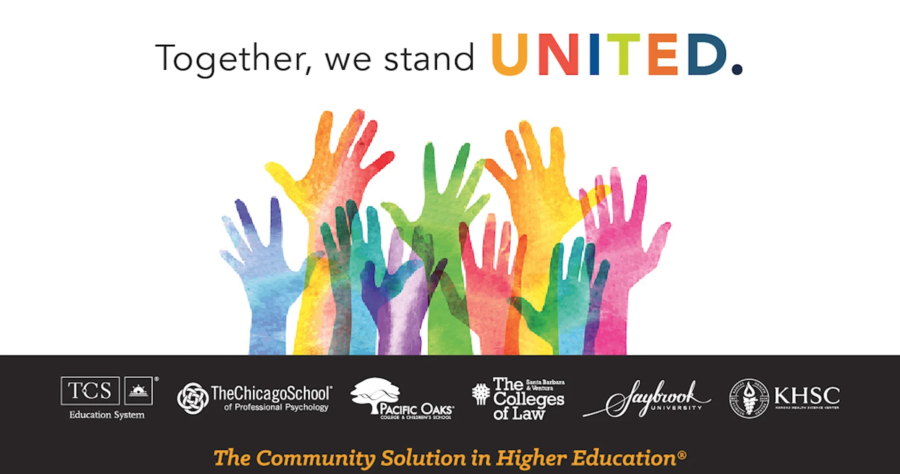In the past year, like every organization, the TCS Education System community has faced challenges of a previously unimaginable scale and duration. Maintaining operations amid the stress, risk and unpredictability of COVID-19 pushed our core value of Radical Cooperation to its fullest expression, allowing us to thrive even as many higher education institutions have faltered.
Twelve months into the experience, the hard work of advancing student success during a pandemic is not yet complete. But with vaccines and spring bringing hope for new beginnings, it’s a good time to look back on what we’ve accomplished and celebrate the value that we can carry forward.
Earlier this year, we shared the unique voices and perspectives from leaders throughout the TCS community as they reflected on the COVID experience. Today, we’ll take a systematic view, exploring the performance of our model and our culture in the face of historic adversity.
Proven: We’re better together.
We’ve all heard the expression “if you want to go fast, go alone; if you want to go far, go together.” But for our leadership team, the spring of 2020 proved that adage wrong. When the crisis struck, leaders from across the system came together immediately to chart the way forward as a team. And far from bogging down the process, this collaborative approach drove both speed and lasting impact.
“When you have a community of colleges and universities, and colleagues right there with you, it takes some of the burden off,” explains TCS President Michael Horowitz, Ph.D. “Of course it didn’t take away the challenge — working together couldn’t solve the pandemic — but it created a calming environment to effectively address the situation.”
TCS Chief of Staff Shari Mikos concurs. “Throughout the process we were all united by the idea of doing whatever it takes to keep students going with their learning, no matter what. There was never any question of if we could keep going, but only of how.”
A spirit of camaraderie is of no small value in a crisis, but the power of collaboration extended far beyond morale into countless practical achievements. As just one example, our IT department was able to deploy Microsoft Teams technology across five different institutions in just two weeks, facilitating remote work and study for more than 10,000 individuals across the TCS community.
System-wide commitment drives decisive action.
“When there are decisions to be made, the more you’re in isolation, the more challenged you are,” says Dr. Horowitz, who credits TCS’ success to weekly “think tank” meetings of leaders from across the community of schools. “We didn’t have to be distracted by what the competition might be doing, because we were in it together — in the family,” he explains. As a result, basic but urgent decisions such as when to shift to fully remote learning, or which technology platforms to adopt, came swiftly and efficiently. “[Decisiveness] really freed us up to focus immediately on execution, which was actually the harder part in this case,” Dr. Horowitz explains.
As the TCS community approached the fall semester, the same decisive spirit that had informed spring crisis management again paid dividends; the entire system reaped the benefits of a proven roadmap for remote operations. Because TCS colleges and universities were able to paint a clear picture of what to expect, they were more successful than many comparable institutions in securing commitments from prospective students. In fact, TCS as a whole saw a 12% new student enrollment increase in fall 2020 while many other schools saw numbers decline.
Resources go further in a community context.
Nationally, the pandemic highlighted the value of centralized systems when managing through crisis, and vividly illustrated some of the risks of operating in silos. When it mattered most, TCS set partner colleges and universities up for success by providing centralized, systematic access to the expertise and resources to quickly operationalize necessary change.
TCS Chief Operating Officer Deborah Markos recalls, “As decisions were made, we were right there with the teams and resources to make sure everyone could quickly understand the implications of choices and put them into action.” This rapid mobilization touched every aspect of student life and college operations. “We had internal communications at the ready to draft messaging. We immediately started assessing how to support student finances. How do we operate admissions remotely? How do we hold virtual events? We asked these questions across the board, always with the benefit of centralized resources to make the activities more effective.”
When each institution began receiving CARES Act funding, a collaborative spirit ensured maximum student benefit from every dollar. The colleges and universities worked together to channel their individual investments into strategically coordinated initiatives, creating holistic impact that was greater than the sum of its parts. This applied to infrastructure needs — like scaling up remote learning technology — as well as operational necessities like rapid training for faculty who found themselves suddenly greeting a screen, rather than a lecture hall, each day.
A moment for gratitude and optimism.
Higher education lost 650,000 jobs in 2020, and saw the rate of enrollment decline double from the prior year. The TCS community is proud and deeply grateful to have weathered this tumultuous period far better than many institutional peers. Despite the pandemic, TCS was able to avoid layoffs entirely and saw gains in both enrollment and student retention during 2020.
The principles that sustained us — Radical Cooperation and laser-sharp focus on student success — were not new. In fact, they have always been the foundation of our culture. But never have they been tested so harshly, nor served so well. As TCS, and the communities it serves, embark on post-pandemic rebuilding, it draws on powerful lessons learned and reaffirmed confidence in its organizational model. Yesterday’s trials have only proven the organization’s readiness to meet tomorrow’s needs, together.










